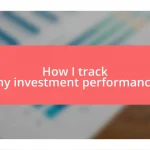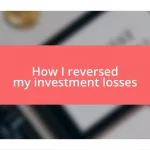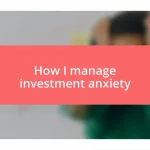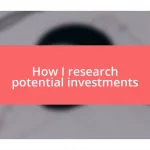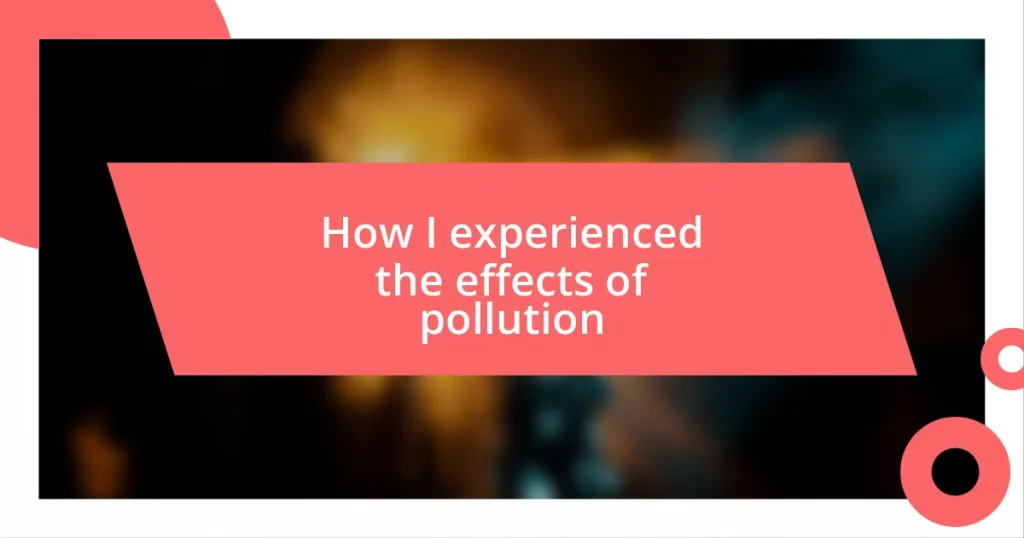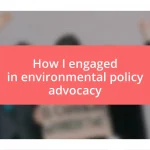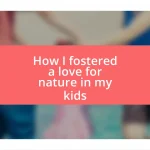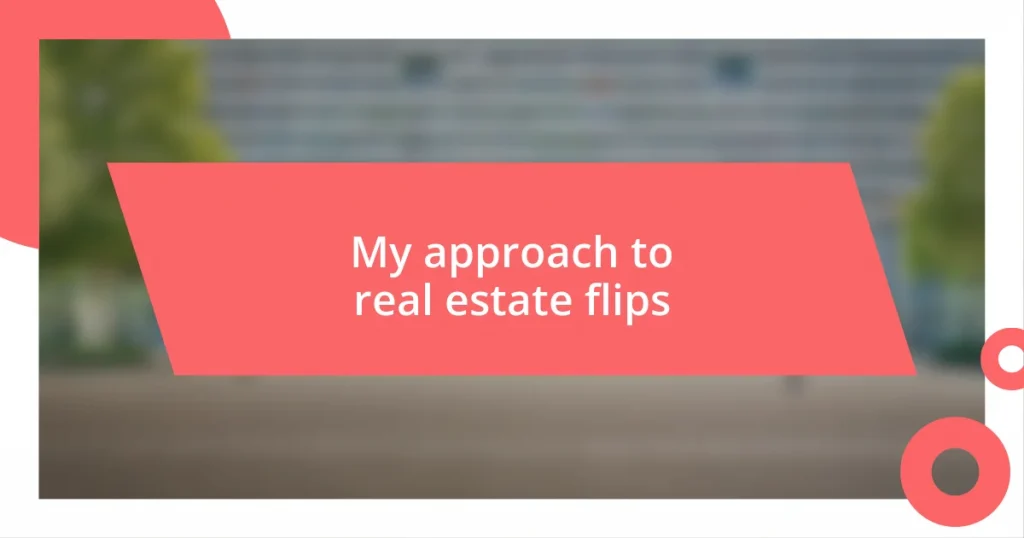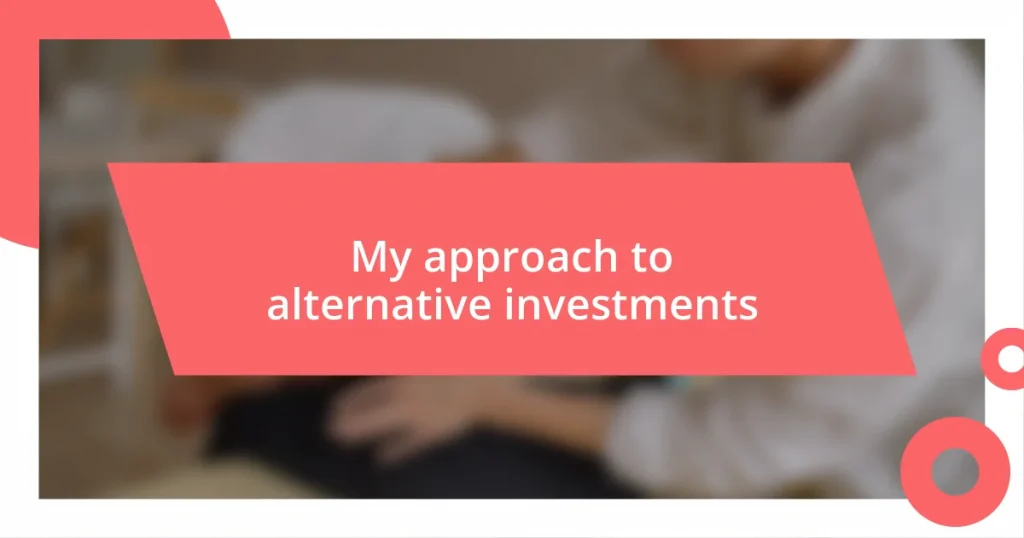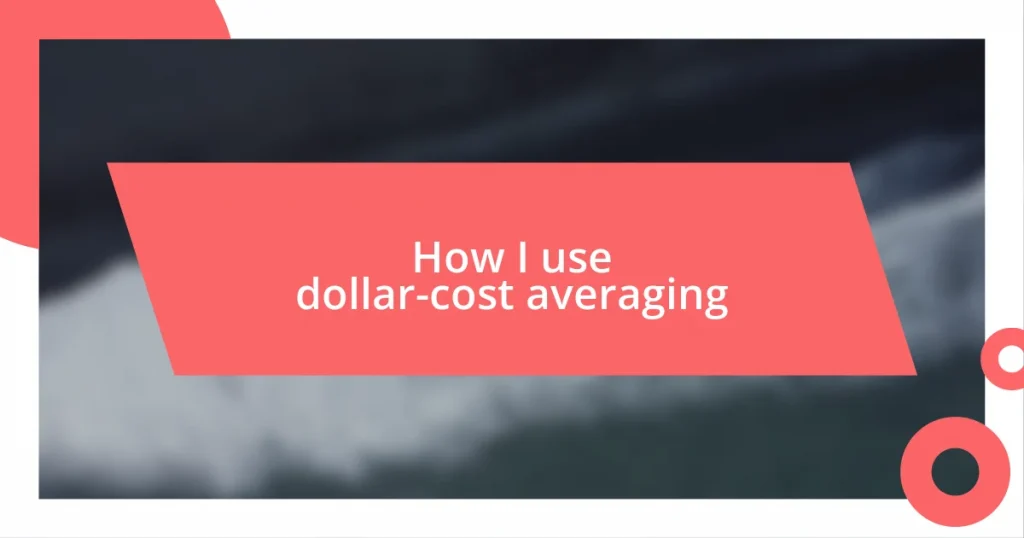Key takeaways:
- The author experienced the emotional and physical impacts of pollution in everyday life, emphasizing its effects on mental well-being and community health.
- Personal encounters with pollution, from childhood beach visits to city smog and wildlife struggles, ignited a passion for advocacy and accountability.
- Strategies for advocating change include fostering community dialogue, partnering with environmental organizations, and engaging with local government for policy improvements.
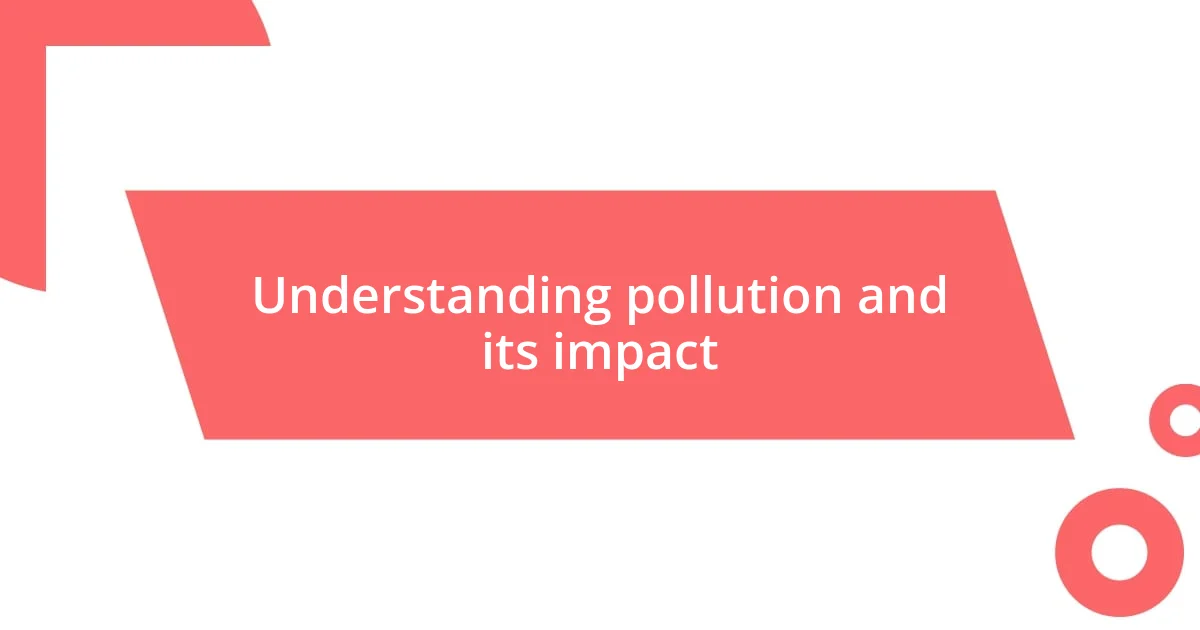
Understanding pollution and its impact
Pollution, as I have come to understand it, isn’t just a buzzword; it deeply affects our daily lives. I remember standing at a busy intersection, overwhelmed by the thick haze of vehicle emissions. It hit me then—how often do we consider the air we breathe or the water we drink? Each tiny particle in that smog isn’t just a statistic; it’s part of our shared existence.
The emotional weight of pollution often sneaks up on you. I once took a deep breath during a weekend hike, only to be met with a dizzying mix of fresh air and distant industrial fumes. That moment reminded me how crucial clean environments are for our mental well-being, turning a simple outdoor experience into a battleground for clarity versus confusion. Have you ever felt that clash?
It’s crucial to recognize that pollution extends beyond mere inconvenience; it can trigger health crises and influence our communities. I’ve seen friends struggle with respiratory issues that surfaced after living near factories. These experiences stir empathy within us—what can be more personal than seeing loved ones affected directly? Reflecting on this, we must ask ourselves, how can we turn our understanding into action for the sake of our health and that of future generations?
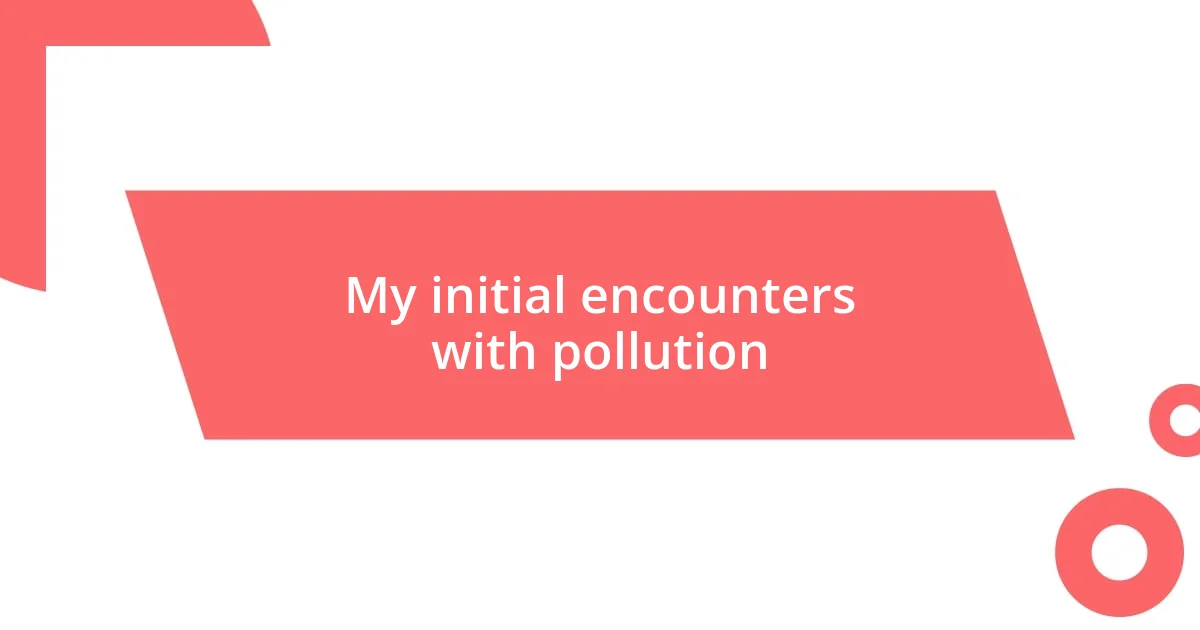
My initial encounters with pollution
My first real encounter with pollution occurred during my childhood when my family visited a beach known for its pristine beauty. To my surprise, the once-clear waters were marred by floating debris and an unpleasant smell. It was disheartening to see a place I cherished turning into something unrecognizable; it sparked a sense of helplessness that I carried with me for years.
When I moved to the city for college, the impact of air pollution overshadowed my experience. I remember waking up one morning, drawn to the vibrant skyline, only to discover that a thick blanket of smog loomed overhead. It felt surreal, almost as if the urban landscape had developed a character of its own—one that was deceitfully beautiful yet haunting. Did it ever strike you how quickly the allure of a city can mask its underlying challenges?
The emotional toll of witnessing pollution on wildlife really hit home for me during a serene afternoon walk in a local park. I stumbled upon a flock of birds that could barely take flight due to respiratory distress. Seeing them struggle ignited a fire within me; how could something so essential to our ecosystem be in peril because of our choices? This experience underscored the urgent need for accountability—it’s imperative we advocate for cleaner choices, not just for ourselves but for every living thing around us.
| Experience | Emotional Reaction |
|---|---|
| Beach visit | Helplessness watching cherished places change |
| City pollution | Surreal realization of hidden challenges |
| Birds in distress | Ignited a passion for advocacy |
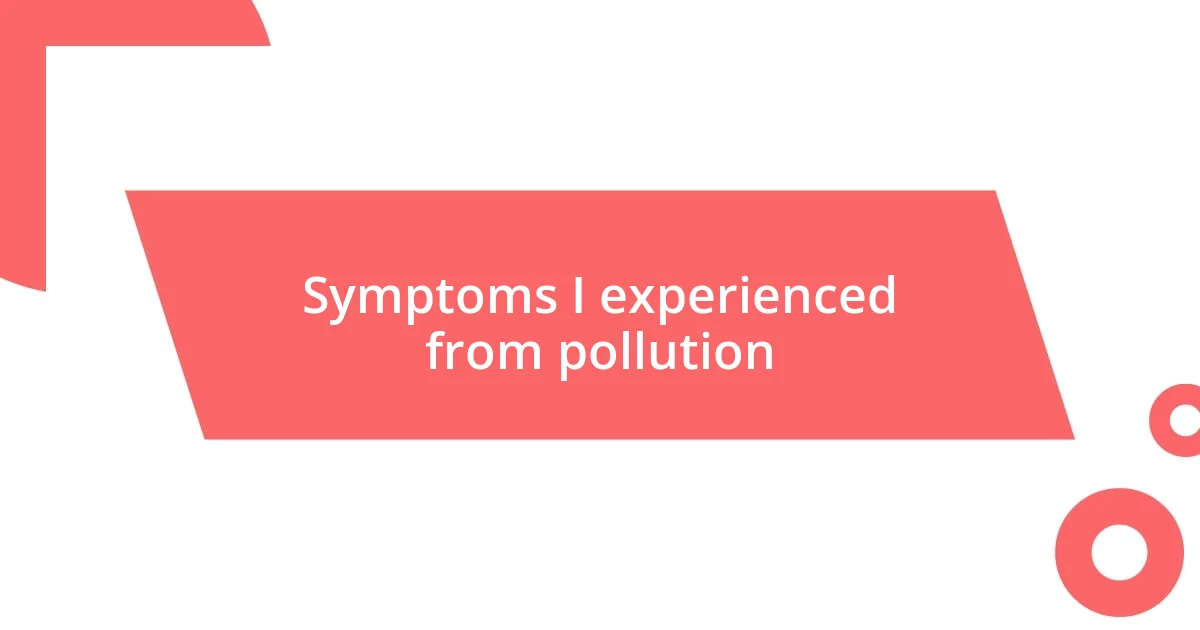
Symptoms I experienced from pollution
Walking through a council area in the heart of the city, I often felt the effects of pollution weighing on me. My initial experiences with smog became increasingly hard to ignore. I started waking up with a persistent coughing fit that seemed to linger throughout the day. The once taken-for-granted act of breathing became a challenge, especially on particularly hazy mornings.
Here are some specific symptoms I encountered:
- Persistent cough: It felt like my lungs were fighting against the air.
- Fatigue: Even with a full night’s sleep, I often felt drained.
- Itchy eyes and skin: My body reacted to the pollutants; irritation became an unwelcome companion.
- Headaches: These were frequent intruders, especially after long days outdoors.
Recognizing these symptoms felt frustrating at first. I longed for relief and clarity but often found myself battling a headache right after spending time outside. There was something unsettling about the realization that the air that surrounded me could be detrimental. I remember a particularly vivid moment when I tried to enjoy a local festival, only to retreat early due to the haze that began to settle around us. The joy of music and laughter faded as I became increasingly aware of the toll pollution was taking on my body. Each symptom felt like a message—these experiences turned the simple act of being outdoors into a reminder of the ongoing battle we face against pollution’s effects.
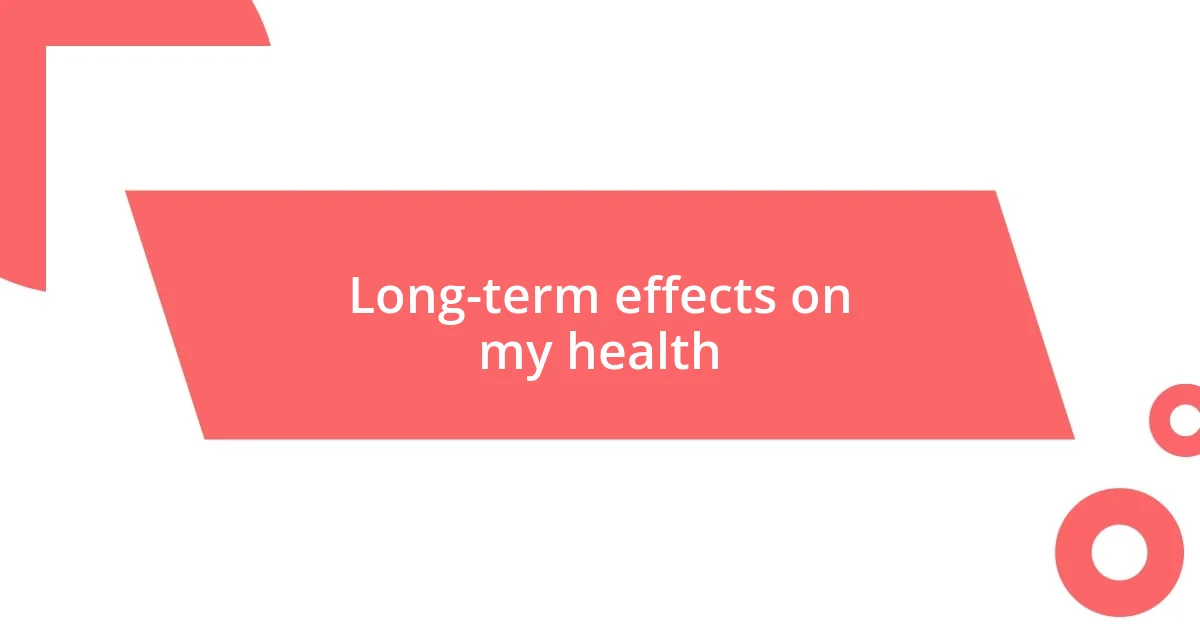
Long-term effects on my health
As time went on, I noticed that the persistent cough transformed from an occasional nuisance into a constant companion. I remember standing in line at a coffee shop, feeling that familiar tightness in my chest when someone mentioned an air quality alert. It’s unsettling to think how the air I breathe every day can ripple through my health in the long term. This cough felt almost emblematic of the struggles I faced—a physical reminder of pollution’s far-reaching effects on my body.
Beyond respiratory issues, I began to grapple with fatigue that seemed to seep into every corner of my life. Even on days when I indulged in restful activities, I felt as if I was dragging an invisible weight behind me. I often found myself wondering, “Am I really resting enough, or is this pollution quietly stealing my energy?” This realization turned those moments of lethargy into something more significant, transforming fatigue into a symbol of the invisible battles we fight against our environment.
Moreover, the impact of pollution rippled into my emotions, as feelings of anxiety and frustration crept in. I vividly recall a day in the park, surrounded by nature, yet feeling an immense sense of unease. My thoughts kept circling back to how much I loved this space but how little control we have over its health. Did it ever feel like nature was crying out for help? This emotional strain has taught me that long-term exposure to pollution isn’t just a physical issue; it reshapes how we engage with our surroundings and ourselves.
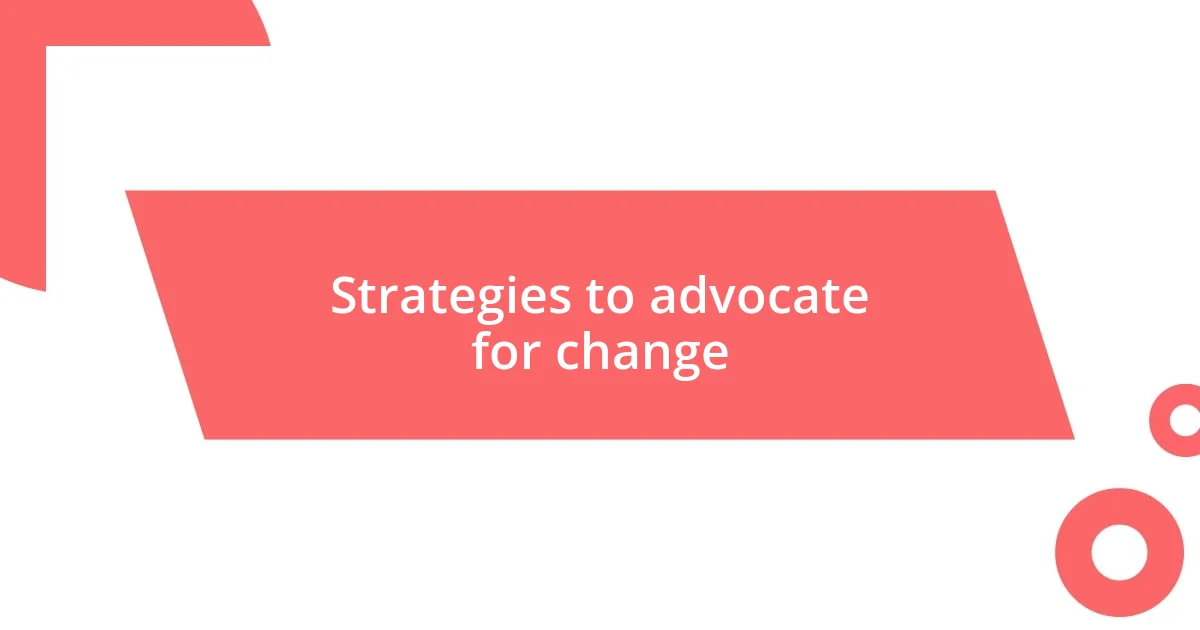
Strategies to advocate for change
Advocating for change requires not only a deep understanding of the issues but also a willingness to mobilize others. I remember attending a community meeting where residents passionately shared their experiences with pollution. It was enlightening to see how collective voices can amplify individual struggles. Creating platforms for dialogue, such as local forums or social media groups, empowers people to voice their concerns and share solutions. Don’t underestimate the power of storytelling; it humanizes the statistics and rallies support.
One effective strategy I’ve found is to partner with local organizations that focus on environmental issues. I once teamed up with a nonprofit that organized clean-up events in our community. Not only did we tackle visible pollution, but we also raised awareness about the sources of waste and air quality. Participating in these events fostered a sense of unity and purpose, making the fight against pollution feel tangible and attainable. When individuals come together like this, it reveals the possibility of real change.
Another approach I found invaluable is advocating for policy change at the local government level. After witnessing the direness of our situation, I gathered a group of friends and wrote to our city council about improving public transportation options. I recall the excitement when we received a response inviting us to discuss our concerns. Engaging directly with decision-makers provides an opportunity to influence policies that can mitigate pollution – it’s a way of turning our frustrations into action. Have you ever felt the thrill of seeing your words spark change?




